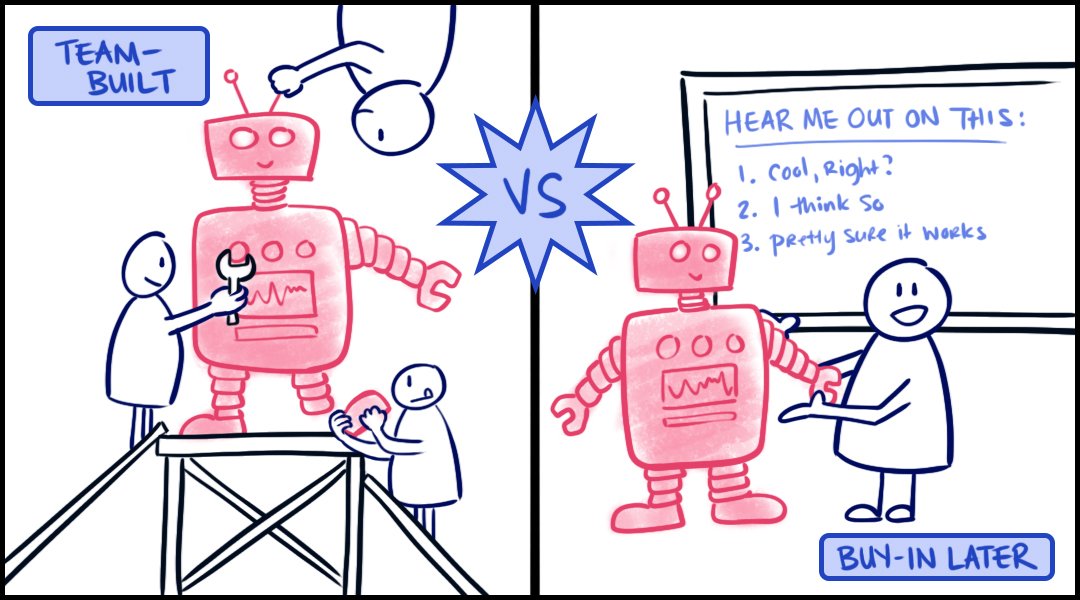I interviewed 8 different product, marketing, and engineering leaders (Slack, Zapier, Webflow, Atlassian, etc) in the last few months of 2020.
Here's what I learned...
Here's what I learned...

1/ Begin projects with a time-boxed period for exploration and research. Learn about the problem space and different players where applicable.
2/ Don't overlook the importance of project management tools and set practices.
When everyone is moving quickly, sometimes in slightly different directions, it's helpful to have a common foundation to come back to.
When everyone is moving quickly, sometimes in slightly different directions, it's helpful to have a common foundation to come back to.
3/ Set clear guidelines of what is and isn't an acceptable solution before you set out to solve a problem. Write this definition down and come back to it.
4/ When working with cross-functional teams, start by writing down the facts so that everyone is coming from the same sense of reality.
Take time to understand how different teams and their incentives play into the project.
Take time to understand how different teams and their incentives play into the project.
5/ If you need someone's help in a project, give them a chance to be involved early on.
Having a sense of ownership around the direction of something is more motivating than coming in as a quick "gun for hire" at the end.
Having a sense of ownership around the direction of something is more motivating than coming in as a quick "gun for hire" at the end.
6/ As your startup scales, systems will change but the basics of project management stay largely the same.
Above all else, be human.
Above all else, be human.
7/ When there's a misunderstanding with a teammate, repeat what was said, and then look for feedback on whether the interpretation is correct.
Start with inquiry, not assumption.
Start with inquiry, not assumption.
8/ Trust comes from knowing what you can expect from people, that they will deliver, and that they care.
While this takes time, one-on-ones and AMAs with leadership can help expedite the process.
While this takes time, one-on-ones and AMAs with leadership can help expedite the process.
9/ Don't continue to do things because it's the way things have always been done. Every process should be questioned for effectiveness since the landscape of the company is changing so rapidly.
10/ Use retrospectives to identify what went well, what didn't go well, and how to improve for the next project.
Make a habit of doing this for all large projects, not just when things go wrong.
Make a habit of doing this for all large projects, not just when things go wrong.
11/ Identify and document publicly who is responsible for company initiatives. This gives employees ownership and makes communication easier when you scale.
12/ Aim for a culture where feedback can flow upward.
This means that managers are getting regular feedback from their direct reports, usually in the forum of a one-on-one or scheduled check-in.
This means that managers are getting regular feedback from their direct reports, usually in the forum of a one-on-one or scheduled check-in.
13/ There are benefits to being your own customer. You can rely more on your intuition and spend less time talking to customers for insight.
14/ Make your writing economical. Get directly to the point and be as clear as possible. This is especially important for remote teams.
https://twitter.com/hnshah/status/1156064424018317312
https://twitter.com/hnshah/status/1156064424018317312
15/ If a messenger like Slack is your platform of choice, learn to incorporate short video messages (e.g. Loom) as a means of asynchronous feedback and collaboration.
16/ Once you exceed 10-15 people in your weekly meeting, move from a discussion-based check-in to something more broadcast-based with a focus on the big picture.
17/ Dedicate different Slack or messenger channels to different use cases to reduce noise.
Even within teams, have channels for public asks, internal discussion, feedback, status updates, etc.
Even within teams, have channels for public asks, internal discussion, feedback, status updates, etc.
18/ Keep one set of priorities so that everyone has a sense of pulling together towards a shared goal. This might be OKRs or something more informal.
Some common mistakes to watch out for: https://twitter.com/lennysan/status/1149682239522742272
Some common mistakes to watch out for: https://twitter.com/lennysan/status/1149682239522742272
19/ Hope this was helpful in some way. A lot of this advice was paraphrased by yours truly, so take it with a grain of salt as usual.
Thanks to everyone who took the time to help out!
@JasonLevin @Gaby_Izarra @jessicawebbica @ashleyfaus @beardigsit @nickvalluri @darrenchait
Thanks to everyone who took the time to help out!

@JasonLevin @Gaby_Izarra @jessicawebbica @ashleyfaus @beardigsit @nickvalluri @darrenchait
20/ If you're interested in checking out the full interviews for more stuff like this, you can subscribe below: https://teamwork.substack.com/welcome

 Read on Twitter
Read on Twitter












